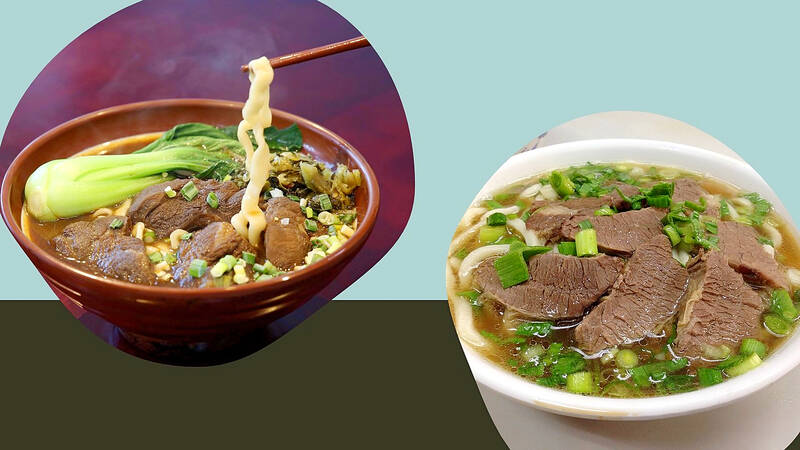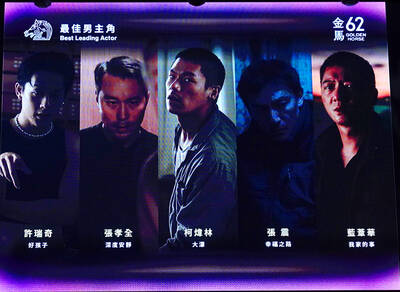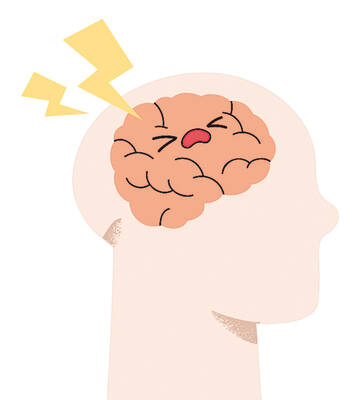對話 Dialogue
清清:唉!今天晚上吃什麼好呢?
Qīngqing: Āi! Jīntiān wǎnshàng chī shénme hǎo ne?

Photo: Pixabay and Wikimedia Commons / 照片:Pixabay 及Wikimedia Commons 提供
華華:你不是喜歡吃牛肉麵嗎?火車站附近的最近有特價,快去排隊吧!
Huáhua: Nǐ búshì xǐhuān chī niúròu miàn ma? Huǒchēzhàn fùjìn de zuìjìn yǒu tèjià, kuài qù páiduì ba!
清清:為什麼有特價?我都沒注意。
Qīngqing: Wèishénme yǒu tèjià? Wǒ dōu méi zhùyì.
華華:因為有國際牛肉麵節啊!愛吃牛肉麵的,正是好時候。
Huáhua: Yīnwèi yǒu Guójì Niúròu Miàn Jié a! Ài chī niúròu miàn de, zhèngshì hǎo shíhòu.
清清:那我們晚上就一起去吧!我請你。
Qīngqing: Nà wǒmen wǎnshàng jiù yìqǐ qù ba! Wǒ qǐng nǐ.
華華:好啊!上次我吃了紅燒的,有點辣,今天我想試試清燉的。
Huáhua: Hǎo a! Shàngcì wǒ chī le hóngshāo de, yǒudiǎn là, jīntiān wǒ xiǎng shìshi qīngdùn de.
清清:清燉的湯頭很不錯,我吃過好幾次了,味道不輸紅燒的。
Qīngqing: Qīngdùn de tāngtóu hěn búcuò, wǒ chīguò hǎojǐ cì le, wèidào bù shū hóngshāo de.
華華:那我今天就要大碗的了,先謝謝你囉!
Huáhua: Nà wǒ jīntiān jiù yào dà wǎn de le, xiān xièxie nǐ luō!
翻譯 Translation
Qingqing: Sigh. What should we eat tonight?
Huahua: Don’t you like beef noodles? The shop near the train station has a special offer, let’s go line up.
Qingqing: Why is there a special offer? I didn’t notice that.
Huahua: Because it’s the International Beef Noodle Festival — the best time for beef noodle lovers.
Qingqing: Then let’s go together tonight. My treat.
Huahua: Great. I had the braised one last time, but it was a bit spicy. I want to try the clear-broth one today.
Qingqing: The clear-broth soup is really good. I’ve had it many times, and it tastes just as good as the braised one.
Huahua: In that case, I’ll order a large bowl. Thanks for the heads up.
生詞 Vocabulary
1. 國際 (guójì) international
2. 牛肉麵 (niúròu miàn) beef noodles
3. 特價 (tèjià) special price, on sale, discount, promotion
4. 排隊 (páiduì) line up, queue, stand in line, wait in line
5. 注意 (zhùyì) pay attention, mind
6. 紅燒 (hóngshāo) braised
7. 清燉 (qīngdùn) clear-broth, clear stewed
8. 湯頭 (tāngtóu) soup base, broth
教材音檔 Audio Files
國立清華大學華語中心提供
By National Tsing Hua University Chinese Language Center:

A: The 62nd Golden Horse Awards ceremony is set for next weekend. So what are the nominees for Best Narrative Feature? B: The nominees are: A Foggy Tale, The Waves Will Carry Us, Left-Handed Girl, Queerpanorama and Mother Bhumi. A: What about the nominees for Best Leading ActorActress? B: Richie Koh, Will Or, Joseph Chang, Chang Chen and Lan Wei-hua are nominated for Best Leading Actor. Caitlin Fang, Rene Liu, Ariel Lin, Alexia Kao and Fan Bingbing are nominated for Best Leading Actress. A: It’s a shame that many of those movies haven’t even been released yet. Meanwhile, some blockbusters won zero nominations this

A: For next weekend’s Golden Horse Awards ceremony, the Lifetime Achievement Award will go to Chen Shu-fang. B: Didn’t Chen win both Best Leading Actress and Best Supporting Actress in 2023? What a talented performer she is. A: But with the debut of the world’s first AI-generated “actress,” human performers may start to worry about their jobs. B: The news says the debut of AI-generated “actress” Tilly Norwood in a recent conference attracted studio executives’ interest. A: With big stars like Robert Redford and Diane Keaton passing away one after another, could human performers gradually be replaced in the future? A: 下週末登場的金馬獎,終身成就獎將頒給陳淑芳! B: 她前年不是同時贏得女主角、女配角獎?真是位好演員。 A: 但隨著全球首位人工智慧(AI)生成「女星」亮相,人類演員或許要開始擔心了。 B:

Have you ever felt a sudden pang of discomfort after handing over cash? That sensation is known as the pain of paying, the emotional sting that __1__ when money leaves your hands. Neuroscientific studies suggest that this pain activates the insula, an area in the brain associated with physical pain and negative emotions. This pain comes about because making a purchase forces people to __2__ the loss of financial resources, making the act of buying feel like a sacrifice. The pain intensifies under certain conditions. The more __3__ people are of the payment—its timing, amount, and method—the stronger the

1. 她把畫掛在書房牆上。 ˇ She hung the picture on her study wall. χ She hanged the picture on her study wall. 註:hanged 是 hang(吊死,絞死)的過去式。hang 作「掛」解時過去式是 hung,過去分詞也是 hung。 2. 他失去平衡,跌倒在地。 ˇ He lost his balance and fell down. χ He lost his balance and felled down. 註:felled 是動詞 fell 的過去式,作「砍倒」解,是及物動詞。這裡作「跌倒」解是 fall,過去式是 fell,過去分詞是 fallen。 3. 我剛才把照相機放在桌上。 ˇ I laid the camera on the table a moment ago. χ I lay the camera on the table a moment ago. 註:從句義可以看出動詞須用過去式「將…放、置」,動詞現在式是 lay,過去式和過去分詞都是 laid:lay, laid, laid;但 lay 也是 lie 的過去式,作「躺」解:lie, lay, lain,是不及物動詞。 注意:兩個形同義不同的 lay,不要用錯。 4. 他去過韓國。 ˇ He has been to Korea. ˇ He visited Korea some time ago. χ He has gone to Korea. 註:He has gone to Korea. 是「他已經到韓國去了」,指目前人已在韓國或在赴韓國的途中。表示「過去曾去過某處」,應用 have/has been,或用動詞的過去式和表示過去時間的副詞來表達。 5.